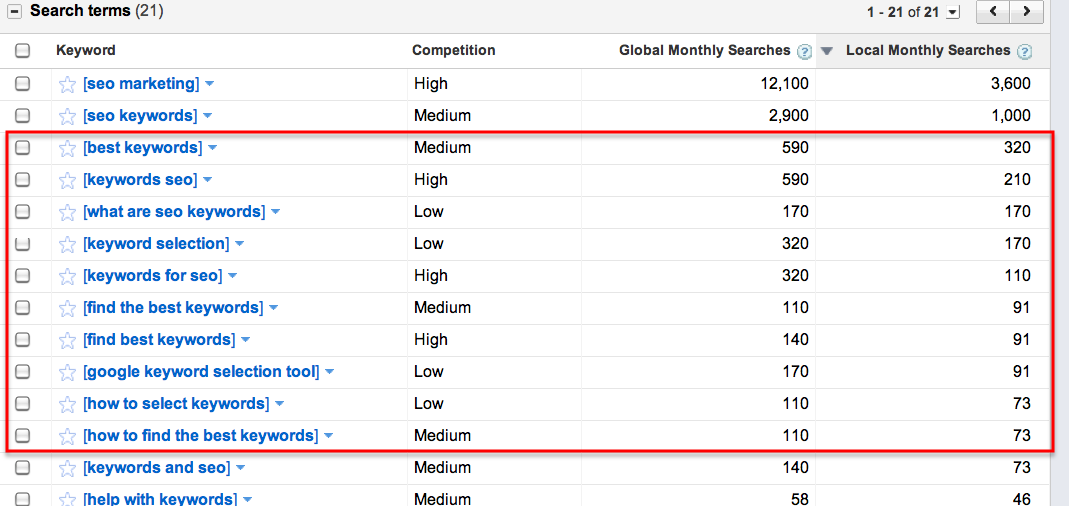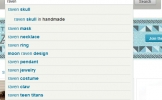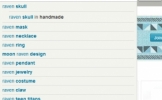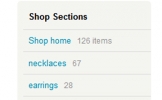What are SEO keywords?
Keywords are typically 'key phrases' — a string of words that people type into their search browser when trying to find a product or service. These keywords are bolded the search results copy on the page. With proper placement of keywords and implementation of SEO basics, you can significantly improve your ranking in Google and other search engines.

The search results shows my search query, DIY Sew-in Labels, in bold.
Tools for finding keyword data
There are several tools that allow you to analyze web traffic but the best keyword tool is Google Adwords. It's free and with Google holding 80% of the search market, you're getting solid keyword data.

How To Build an Artist Website
Sign up for our newsletter and get the book How to Build an Artist Website for free!
Adwords was primarily developed for people creating paid advertising campaigns but is equally valuable for organic (non-paid) search. You can find many articles, tutorial, and suggestions for utilizing the Adwords features and keyword research.
It’s important to use the correct Adwords filters, one important filter is setting search parameters to [Exact] search. This article on the Google keyword selection tool provides a great overview on how to maximize Adwords for SEO.
How to choose keywords
Target realistic terms. In Adwords, look at the Local Monthly Searches and Competition columns, choose those that have a smaller search volume and lower competition. For this article, I did keyword research first and picked an attainable set in the middle.
Local Monthly Searches = times/month the words are searched for in the US
Global Monthly searches = times/month the words are searched for in the WORLD
Competition = how many people are targeting the keyword (more appicable to paid search but the difficulty in ranking for this term is relevant for SEO as well)

Target keywords with a lower volume of 'LOCAL monthly searches' (column 4) and low 'Competition' (column 2)
whenever possible.
Avoid keywords with a huge search volume. These look appealing, who wouldn't want 3,600 new web customers each month! However, the reality of getting on Page 1 for an extremely popular term is highly unlikely. It's much better to land on page 1 for keywords with a 91 monthly searches, than page 15 of Google for those with higher search volume. In SEO, page 1 is all that matters!
Be relevant. Ranking on page 1 in search results doesn’t matter if your Google keywords don’t accurately reflect your offerings. People won’t click through to your site if they don't see what they were looking for, you've wasted time and energy optimizing for keywords that will never result in a sale.
Think like a customer first. What words do you use when YOU search on the web? Avoid industry jargon and try to use descriptive terms or word modifiers such 'unique silver jewelry' or 'handmade scented candles' or ‘custom printed t-shirts’. These tend to have smaller search volume and competition. Include common spellings variations in your research.
How to use keyword marketing
Even with the right keywords; a single article, blog post, or product description won't have a lot of SEO traction. You need multiple pages of content with keywords sprinkled througout. Select a group of keywords (perhaps 15-20) and use them as naturally, and as often, as you can on your site. Do NOT stuff them or force them into copy. This is spammy and you can be penalized by engines. Consistently use your keywords in other marketing initiatives like blog posts, social media, hyper-links.
Look at the IndieMade website, you’ll see many pages and pieces of content dedicated to information on ‘Websites for Artists’. This mass of material and consistently repeated keywords, tells the search engines that there are relevant resources on artist websites. Using keywords in your hyperlinks (instead of 'click here') tells the search crawler what is at the other end of the link.
Finding great keywords are just one piece of the whole SEO puzzle. But, they are worth the time, and the best place start.




